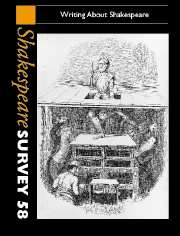Book contents
- Frontmatter
- Having Our Will: Imagination in Recent Shakespeare Biographies
- Toward a New Biography of Shakespeare
- Jonson, Shakespeare and the Exorcists
- ‘Lending soft audience to my sweet design’: Shifting Roles and Shifting Readings of Shakespeare’s ‘A Lover’s Complaint’
- ‘Armed at point exactly’: The Ghost in Hamlet
- Writing About Motive: Isabella, the Duke and Moral Authority
- Writing Performance: How to Elegize Elizabethan Actors
- Elizabeth Montagu: ‘Shakespear’s poor little Critick’?
- Rewriting Lear’s Untender Daughter: Fanny Price as a Regency Cordelia in Jane Austen’s Mansfield Park
- The Prequel as Palinode: Mary Cowden Clarke’s Girlhood of Shakespeare’s Heroines
- Shakespeare Among the Workers
- Virginia Woolf Reads Shakespeare: Or, her Silence on Master William
- Shakespeare and the Invention of the Epic Theatre: Working with Brecht
- Dramatizing the Dramatist
- Shakespeare in Drama Since 1990: Vanishing Act
- Writing about [Shakespearian] performance
- Shakespeare and the Prospect of Presentism
- Writing Shakespeare in the Global Economy
- The ‘Complexion’ of Twelfth Night
- Translation as Appropriation: Vassilis Rotas, Shakespeare and Modern Greek
- How Old Were Shakespeare’s Boy Actors?
- Mistress Tale Porter and the Triumph of Time: Slander and Old Wives’ Tales in The Winter’s Tale
- Shakespeare Performances in Ireland, 2002–2004
- Shakespeare Performances in England, 2004
- Professional Shakespeare Productions in the British Isles January–December 2003
- The Year's Contributions to Shakespearian Study 1 Critical Studies
- 2 Shakespeare in Performance
- 3 Editions and Textual Studies
- Books Received
- Index
Shakespeare in Drama Since 1990: Vanishing Act
Published online by Cambridge University Press: 28 March 2007
- Frontmatter
- Having Our Will: Imagination in Recent Shakespeare Biographies
- Toward a New Biography of Shakespeare
- Jonson, Shakespeare and the Exorcists
- ‘Lending soft audience to my sweet design’: Shifting Roles and Shifting Readings of Shakespeare’s ‘A Lover’s Complaint’
- ‘Armed at point exactly’: The Ghost in Hamlet
- Writing About Motive: Isabella, the Duke and Moral Authority
- Writing Performance: How to Elegize Elizabethan Actors
- Elizabeth Montagu: ‘Shakespear’s poor little Critick’?
- Rewriting Lear’s Untender Daughter: Fanny Price as a Regency Cordelia in Jane Austen’s Mansfield Park
- The Prequel as Palinode: Mary Cowden Clarke’s Girlhood of Shakespeare’s Heroines
- Shakespeare Among the Workers
- Virginia Woolf Reads Shakespeare: Or, her Silence on Master William
- Shakespeare and the Invention of the Epic Theatre: Working with Brecht
- Dramatizing the Dramatist
- Shakespeare in Drama Since 1990: Vanishing Act
- Writing about [Shakespearian] performance
- Shakespeare and the Prospect of Presentism
- Writing Shakespeare in the Global Economy
- The ‘Complexion’ of Twelfth Night
- Translation as Appropriation: Vassilis Rotas, Shakespeare and Modern Greek
- How Old Were Shakespeare’s Boy Actors?
- Mistress Tale Porter and the Triumph of Time: Slander and Old Wives’ Tales in The Winter’s Tale
- Shakespeare Performances in Ireland, 2002–2004
- Shakespeare Performances in England, 2004
- Professional Shakespeare Productions in the British Isles January–December 2003
- The Year's Contributions to Shakespearian Study 1 Critical Studies
- 2 Shakespeare in Performance
- 3 Editions and Textual Studies
- Books Received
- Index
Summary
My topic isolates a small part of the vast subject Shakespeare and modern drama, the title of my latest project. When Virginia Woolf confronted a similarly challenging subject, ‘women and fiction’, for an address at Cambridge University in 1928, she ‘sat down on the banks of a river and began to wonder what the words meant’. I found this eminent example reassuring and tried the same exercise – indoors. With time a few conclusions emerged which led me to notice a group of plays since 1990 using materials from Shakespeare’s life. A brief review of the exercise will follow the logic that situates these dramatic texts.
In the process of wondering what the words meant, the analogy of a map proved helpful, starting with definitions of the title’s co-ordinates. The name ‘Shakespeare,’ with its wide array of meanings, now signifies the historical person, his texts, and attitudes toward both. By comparison, the term ‘modern drama’ has narrower limits. Specialists set its chronology between 1850 and the present, starting with plays created by important dramatists of the nineteenth century who lived into the twentieth century. Consequently, ‘modern drama’ refers primarily to dramatic texts of the period, extant or not, rather than productions or theatre history; but the distinction can blur when the staging of a well-known script like Hamlet appears extreme enough to constitute a new play.
As co-ordinates, Shakespeare and modern drama chart vast, complex and unpredictable terrain. The topography extends, more or less, into every continent; and it covers a period over 150 years long. Substantial evidence, such as published scripts and theatre reviews, indicates that it contains hundreds of modern plays related to Shakespeare. Should our calculations include ephemeral productions, the kinds performed by amateur groups and local theatre festivals, the number might increase to thousands. Not surprisingly, this difficult territory remains largely unexplored.
- Type
- Chapter
- Information
- Shakespeare Survey , pp. 148 - 159Publisher: Cambridge University PressPrint publication year: 2005



